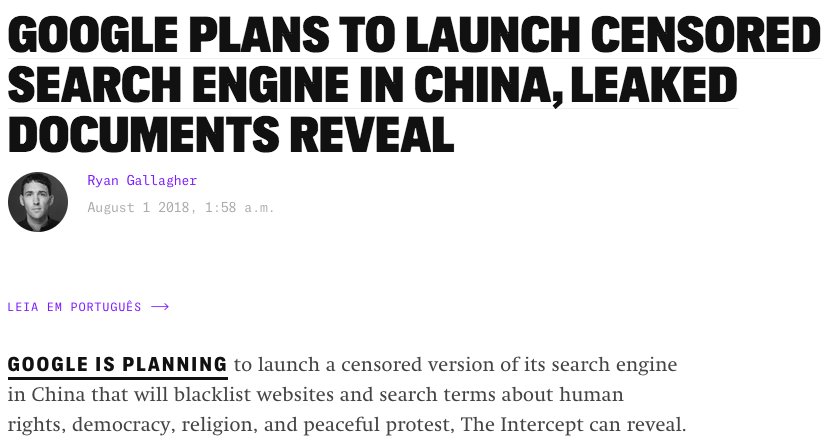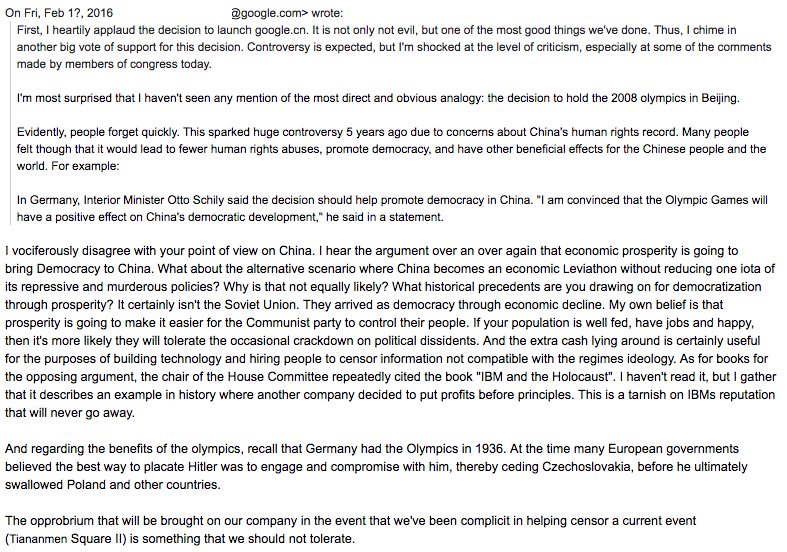Jacobtldr's Categories
Jacobtldr's Authors
Latest Saves
Imagine for a moment the most obscurantist, jargon-filled, po-mo article the politically correct academy might produce. Pure SJW nonsense. Got it? Chances are you're imagining something like the infamous "Feminist Glaciology" article from a few years back.https://t.co/NRaWNREBvR pic.twitter.com/qtSFBYY80S
— Jeffrey Sachs (@JeffreyASachs) October 13, 2018
The article is, at heart, deeply weird, even essentialist. Here, for example, is the claim that proposing climate engineering is a "man" thing. Also a "man" thing: attempting to get distance from a topic, approaching it in a disinterested fashion.

Also a "man" thing—physical courage. (I guess, not quite: physical courage "co-constitutes" masculinist glaciology along with nationalism and colonialism.)

There's criticism of a New York Times article that talks about glaciology adventures, which makes a similar point.

At the heart of this chunk is the claim that glaciology excludes women because of a narrative of scientific objectivity and physical adventure. This is a strong claim! It's not enough to say, hey, sure, sounds good. Is it true?
u'' - related to risk aversion
u''' - related to precautionary saving (prudence)
u'''' - ??
I heard once that @mileskimball had intuition for the roles of 4th & higher-order derivatives of u() -- would love to be able to break that out at an Econ party
The derivatives of the Position vector with respect to time have interesting names:
— Fermat's Library (@fermatslibrary) October 19, 2018
Velocity (v) = change in Position
Acceleration (a) = change in Velocity
Jerk (j) = change in Acceleration
Snap (s) = change in Jerk
Crackle (c) = change in Snap
Pop (p) = change in Crackle
\U0001f9d0 pic.twitter.com/fo7RNjum6f
[Ain't no party like an Econ party, 'cause an Econ party discusses higher-order risk attitudes]
As a former Google engineer I wanted to share some information on what it's like to be inside Google as these decisions are made

2/ I previously shared that in 2006 I was an engineer who worked on Google News and was asked to write code to censor new results in China.
I've found some emails from 2006 that shed more light on the censorship requirements of the Chinese
When I worked at Google, as an engineer on Google News, I was asked to write code to censor news articles in China (circa 2006). I refused and they took me off the project and put someone else on it.
— Vijay Boyapati (@real_vijay) September 16, 2018
Doesn't surprise me Google is back at it. "Don't be Evil" is a Google myth. https://t.co/VEenWbPxkW
3/ The emails I'm presenting came from a mailing list at Google where employees discussed topics on politics and economics. I have formatted the emails for readability and redacted the names of my colleagues, with whom I was debating. The topic was the 2008 Olympics in China.

4/ The striking fact that I had forgotten about until I rediscovered these emails was that China required Google to censor information both broadly (entire news sections were to be censored) and extremely expeditiously (Google needed to comply with requests within 15 minutes)
5/ It is very likely that the same censorship requirements will apply to the Dragonfly project that Google is currently working on and perhaps the requirements have become even more stringent given Google's new willingness to comply with the Chinese state.
Jftr, I don't love Uber in the least, and I'm not only saying this as an economist, but also as someone who knows more about this particular subject than 95% of economists. Unlike Google, Uber was never not evil.
Uber\u2019s secret weapon is its team of economists https://t.co/4Lvqr1hTC2
— Quartz (@qz) October 14, 2018
"Economists love Uber because it’s the closest you can get to taking the pure economic theory of textbooks and summoning it to life."
The problem with that is 1. Uber's business model is straight up monopoly rents or bust, 2. textbook economics is toxic waste in mobility.
"Uber created a massive open market, governed first and foremost by the forces of supply and demand."
Probably the biggest piece of bunkus. Transportation is first and foremost governed by the things transportation science looks at, a field quite distinct from economics.
Clearly @qz has never heard of it, and I from my experience most economists haven't either. One of the things transportation science deals with is the prevention of bodily harm, not in small part bc cars can become dangerous weapons in the wrong hands.
"Along the way it broke up the taxi monopoly"
There was never a taxi monopoly. Indeed the taxicab industry was dominated by small players. Inefficiencies and the need for regulation in taxicab are largely the result of circumstances "textbook economics" doesn't address.
If you're on Twitter all the time - as every political commentator now is - it's easy to think that whiny, big-talking Twitter slacktivists are "the Dems".
But what's happening out there on the ground?
— VeryHiddenGeniusHat (@Popehat) October 18, 2018
This is another reason I think Twitter is so bad for society.
It convinces intellectuals and commentators that practically everyone who's on their side is an extremist.
Which makes them tolerate extremism out of a (false) feeling of necessity.
If you stay on Twitter too much (which we all do now), you start to think that the typical left-of-center person is some British wanker who quote-tweets "Imagine thinking this" to anyone who doesn't like the idea of "ending capitalism".
But he is not typical.
A majority of Americans are not on Twitter.
But *every* journalist, commentator, and intellectual *has* to be on Twitter.
So every journalist, commentator, and intellectual comes face to face with big-talking slacktivist faux-extremists day in and day out.
It's a problem!!
Online bubbles full of shouty faux-extremists are, in general, fine.
The difference is that every journalist, commentator, and intellectual is essentially forced to exist in THIS bubble, because their jobs require it.
Twitter is a dystopian technology.
(end)




























